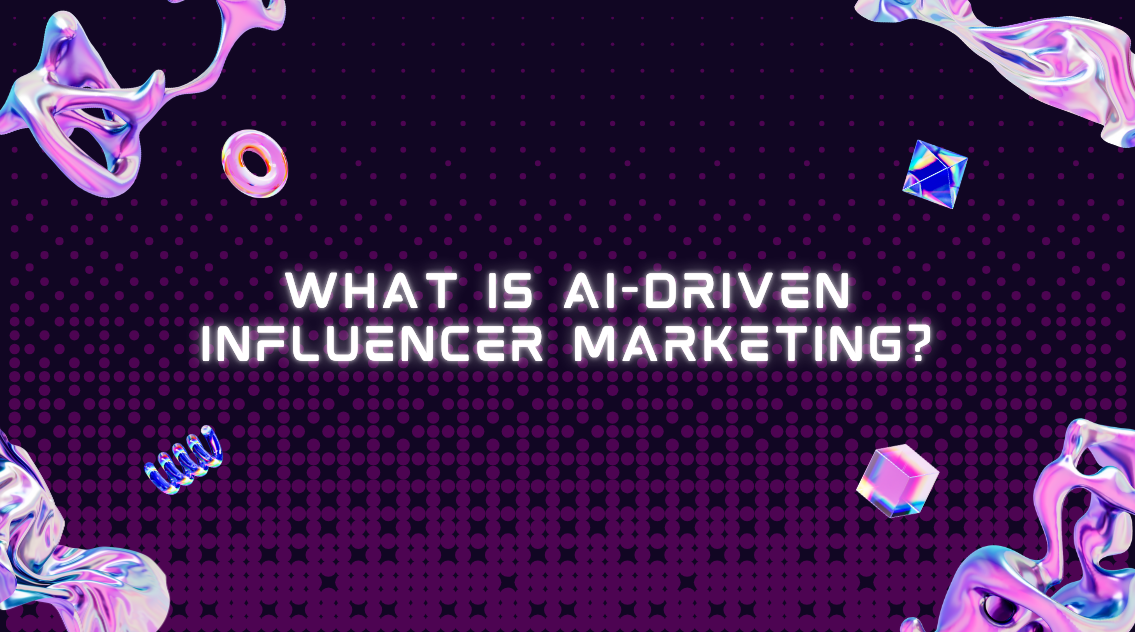What is AI-driven Influencer Marketing?

Why Influencer Marketing Needs a Smarter Edge
Influencer marketing is not a new glittering medium anymore, and it is now a 21billion business. However, herein the problem: when more brands rush to the influencers, prices will increase, and listeners will become more divided, and the ROI will be more difficult to track.
In the case of B2B SaaS founders and digital marketers, the situation is even more critical. You can not simply pay a lifestyle influencer to hold your product as in B2C. You require clear targeting, genuine voices and quantifiable outcomes. This is where the role of influencer marketing by AI comes in.
Consider it to be a brain upgrade to influencer marketing, that is, to automate research, better targeting of campaigns, predicting ROI, and identifying fake followers before you blow budget.
In this article, we’ll break down what AI-driven influencer marketing really means, how it works, tools you can use, step-by-step strategies, and future trends you should prepare for.
What is AI-driven Influencer Marketing?
AI-driven influencer marketing is the use of artificial intelligence technologies—like machine learning, natural language processing (NLP), and predictive analytics—to identify, manage, and optimize influencer campaigns.
Instead of scrolling through Instagram or LinkedIn to find the right Profile for your Brand / Campaign, AI tools can:
- Scan millions of profiles across platforms.
- Analyze audience demographics (age, location, profession, interests).
- Predict engagement quality (not just likes, but quality interactions).
- Automate outreach and reporting.
Simple Example:
Consider you have a B2B SaaS application that is a remote team collaboration product. A conventional search may bring out productivity bloggers who have high following. However, an AI tool will go further - to identify middle-level LinkedIn creators that share about the challenges of hybrid work, with a focused following of the HR staff and founders of a startup. That is accuracy in targeting that you find difficult to do manually.
Why AI in Influencer Marketing Matters: Benefits & Use Cases
1. Smarter Influencer Discovery
- AI algorithms analyze engagement authenticity, follower quality, and niche relevance—eliminating guesswork.
- Use case: A SaaS cybersecurity firm finds micro-influencers on LinkedIn with IT managers as their core audience.
2. Fraud Detection
- Fake followers are a $1.3 billion problem. AI detects suspicious spikes in followers or engagement that look inauthentic.
- Use case: AI flags a marketing influencer with 40% bot-driven engagement before a brand signs a costly deal.
3. Audience-Content Matching
- AI doesn’t just check follower counts; it maps content resonance. Who responds to what topics?
- Use case: A project management SaaS matches with an influencer whose audience often engages with productivity hacks—not fashion hauls.
4. Predicting ROI
- Predictive analytics help estimate campaign performance before launch.
- Use case: A B2B SaaS startup tests multiple influencer segments virtually, choosing the one with the highest projected trial sign-ups.
5. Automated Campaign Management
- From outreach templates to post-campaign analytics dashboards, AI reduces repetitive manual work.
- Use case: A digital marketing manager runs 10 micro-influencer campaigns simultaneously with AI handling reporting.
How to Build an AI-driven Influencer Marketing Strategy?
Here’s a practical framework for SaaS founders and marketers:
Step 1: Define Campaign Goals
- Are you driving brand awareness?
- Generating qualified leads?
- Pushing free trial sign-ups?
Example: A SaaS CRM company wants 500 trial sign-ups in Q2.
Step 2: Use AI Tools for Influencer Discovery
- Filter by industry (SaaS, HR tech, cybersecurity).
- Validate audience authenticity with AI fraud checks.
Example: Narrow LinkedIn influencers with 10K–50K followers, 70%+ engagement from decision-makers.
Step 3: Predict ROI Before Signing Contracts
- Use predictive analytics to test scenarios (macro vs. micro-influencers).
- Forecast cost per acquisition (CPA).
Example: AI predicts micro-influencers deliver 3x better CPA than macro-influencers for B2B SaaS.
Step 4: Automate Outreach & Collaboration
- Use AI-powered CRMs for influencer communication.
- Send customized pitches at scale.
Step 5: Monitor Campaign in Real Time
- AI dashboards track CTR, sign-ups, and engagement quality.
- Adjust mid-campaign based on performance.
Step 6: Optimize with Post-Campaign Analytics
- Feed campaign data back into AI systems.
- Refine influencer lists for future.
Future Trends in AI-driven Influencer Marketing
1. AI-Generated Influencers (Virtual Humans): Brands like Prada and Samsung already experiment with AI influencers like Lil Miquela. Expect B2B niches to test virtual thought leaders.
2. Hyper-personalized Campaigns: AI will craft influencer content tailored to specific buyer personas—not just industries.
3. Blockchain + AI Transparency: Combining blockchain verification with AI fraud detection could make influencer contracts tamper-proof.
4. Voice & Video Analysis: AI will evaluate tone of voice, video authenticity, and sentiment to ensure influencer-brand alignment.
Conclusion
AI-driven influencer marketing doesn’t replace human creativity—it amplifies it with data-driven precision. For B2B SaaS founders and digital marketers, AI bridges the gap between massive influencer pools and niche, high-value audiences.
Instead of wasting ad spend on “influencers” with inflated numbers, AI ensures every dollar works harder—matching your product with the right voice at the right time.
The future of influencer marketing won’t just be about who has the most followers, but who has the most relevant and authentic conversations. And AI is the key to making that future measurable and scalable.
FAQs
Q1. What is AI-driven influencer marketing?
AI-driven influencer marketing uses artificial intelligence tools to identify, analyze, and optimize influencer campaigns—improving targeting, fraud detection, ROI prediction, and reporting.
Q2. How does AI help in influencer discovery?
AI scans millions of profiles, analyzes audience demographics, and checks engagement authenticity to match brands with the most relevant influencers.
Q3. Which are the best AI influencer tools?
Popular AI influencer tools include Viral Pitch, CreatorIQ, Influencity, HypeAuditor, and Upfluence.
Q4. Can AI prevent influencer fraud?
Yes. AI detects fake followers, engagement spikes, and bot-driven activity to protect marketing budgets.
Q5. Is AI-driven influencer marketing relevant for B2B SaaS?
Absolutely. AI ensures SaaS brands connect with niche influencers (LinkedIn creators, industry experts) whose audiences include decision-makers and buyers.